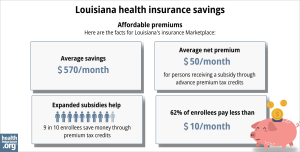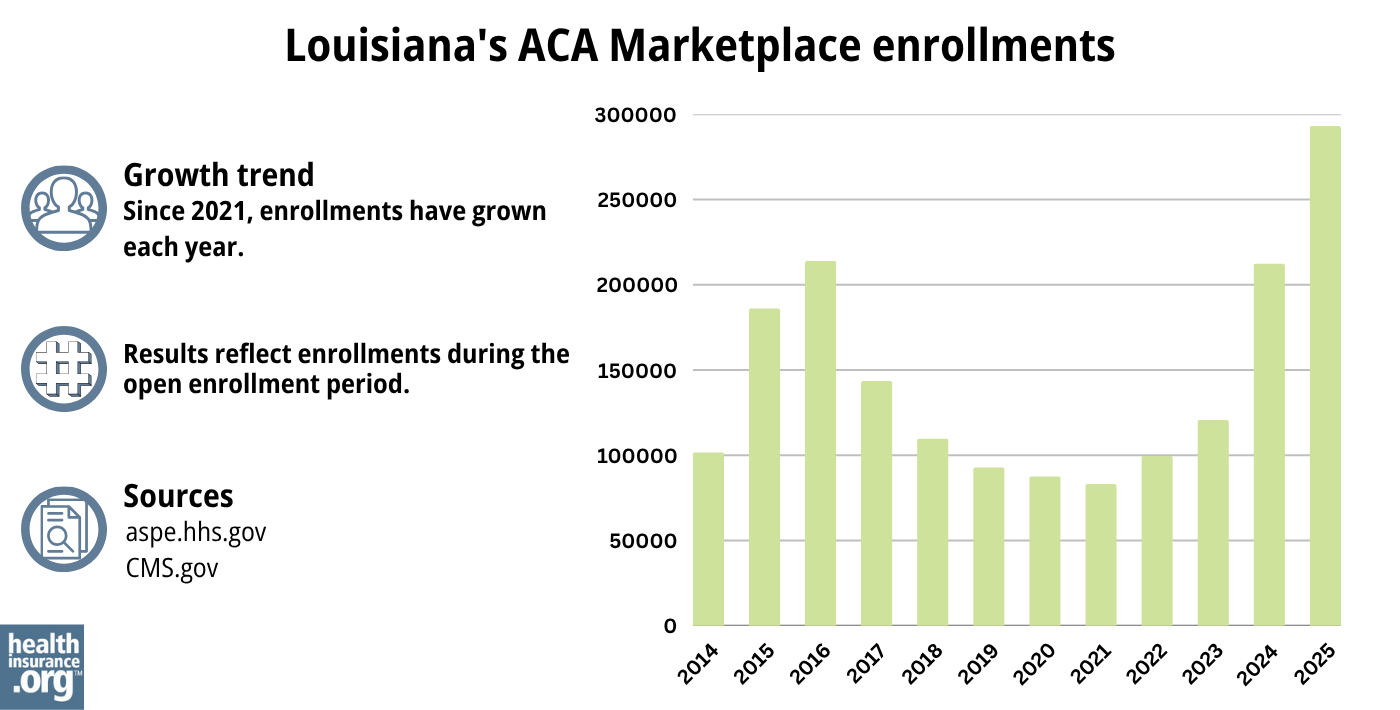Home > Health insurance Marketplace > Louisiana
Louisiana Marketplace health insurance in 2025

Compare ACA plans and check subsidy savings from a third-party insurance agency.

Louisiana health insurance Marketplace guide
This guide, including the FAQs below, was created to help make it easier to choose the right health insurance for yourself and your family. A plan from the Affordable Care Act (ACA) Marketplace may be a good choice for many people.
Louisiana uses the federal health insurance exchange to help people sign up for ACA plans. The exchange is also known as the ACA Marketplace or Obamacare Marketplace.
The federal government runs the Louisiana Marketplace website, HealthCare.gov, which lets you shop for health plans offered by four private insurance companies3 (one of the companies offers plans under two separate entities; see details below). Plan availability varies from one part of the state to another.4
If you buy a plan from the Marketplace, the government may help pay your premiums through an income-based advance premium tax credit (APTC). Before subsidies are applied, overall average premiums in the individual market in Louisiana decreased by 7.9% for 2025.3
Frequently asked questions about health insurance in Louisiana
Who can buy Marketplace health insurance?
If these apply to you, you can buy individual and family health insurance from Louisiana’s Marketplace:
- You live in Louisiana.
- You are lawfully present in the U.S.
- You’re not enrolled in Medicare.
- You’re not incarcerated.
Many people, like early retirees not yet on Medicare, self-employed people, and those who work for small businesses without health benefits, buy health insurance on the Marketplace.
Eligibility for financial assistance, such as premium subsidies and cost-sharing reductions, is based on your income and how it compares with the cost of the second-lowest-cost Silver plan in your area (which depends on your age and location). In addition, you may qualify for financial assistance in the Marketplace if:
- You don’t have access to affordable health coverage through your employer. If your employer offers coverage, but you feel it’s too expensive, our Employer Health Plan Affordability Calculator can help you understand if you might qualify for premium subsidies.
- You’re not eligible for Medicaid/CHIP.
- You’re not eligible for premium-free Medicare Part A.5
- You file a joint tax return with your spouse, if you’re married.6
- You can’t be claimed by someone else as a tax dependent.6
When can I enroll in an ACA-compliant plan in Louisiana?
You can sign up for ACA-compliant individual and family health plans in Louisiana between November 1 and January 15. This is known as open enrollment.7
- Coverage starts on January 1 if you enroll by December 15.
- Coverage starts February 1 if you enroll between December 16 and January 15.
After January 15, you can sign up for or make changes to an ACA Marketplace health through a special enrollment period (SEP). To qualify for a SEP, you’ll generally need a qualifying life event.
But there are instances where you don’t need a qualifying life event to apply outside of open enrollment. For example:
- If you’re eligible for premium tax credits and your income is not more than 150% of the poverty level, you can enroll anytime.
- If you’re a Native American, you can enroll whenever necessary.8
- If you lose Medicaid or CHIP between March 31, 2023 and November 30, 2024, you can enroll through the extended SEP.9
How do I enroll in a Marketplace plan in Louisiana?
You can enroll in a Louisiana health insurance Marketplace plan:
- Directly through HealthCare.gov, the ACA exchange website
- By phone at (800) 318-2596 (TTY: 1-855-889-4325). Talk to an agent 24 hours a day, seven days a week, except for holidays.
- With the help of agents, navigators, or certified application counselors (available over the phone or online; some offer in-person meetings as well).
- Via an approved enhanced direct enrollment entity.10
How can I find affordable health insurance in Louisiana?
In Louisiana, people who can’t get health plans through an employer may find affordable coverage on the ACA Marketplace (HealthCare.gov). Under the ACA, you may qualify for income-based premium subsidies called Advance Premium Tax Credits (APTC). Premium subsidies have been enhanced under the American Rescue Plan and Inflation Reduction Act, making them larger and more widely available through 2025.
As of early 2024, 96% of Marketplace enrollees in Louisiana were receiving APTC. The average subsidy amounted to $666/month, reducing the average net premium to about $107/month (including the 4% of enrollees who paid full price).11
(Note that the numbers in the graphic below are based on total enrollment during the open enrollment period for 2024, with different metrics and data than the effectuated enrollment details described above.)

Source: CMS.gov12
In addition to APTC, you may qualify for cost-sharing reductions (CSR), which help you pay for your deductibles and out-of-pocket expenses.13 CSR benefits are only available on Silver-level plans, and your income must be no more than 250% of the federal poverty level to be eligible for CSR.14
Another way to find affordable health insurance in Louisiana is through the state’s Medicaid program. Louisiana has expanded Medicaid under the ACA, so adults under age 65 are eligible for Medicaid with household income up to 138% of the poverty level.
Short-term plans may be a low-cost alternative for those who are not eligible for employer coverage, Medicare, Medicaid, or Marketplace subsidies. However, short-term plans are not subject to ACA regulations, so they generally offer less robust benefits and fewer consumer protections. And new short-term plans are now limited to total durations of no more than four months, including renewals.
How many insurers offer Marketplace coverage in Louisiana?
Four private insurance companies offer coverage through Louisiana’s health insurance Marketplace,3 although Blue Cross and Blue Shield of Louisiana offers plans via two separate entities (see premium change details below).
As is the case in most states, plan availability varies from one part of the state to another, as each insurer sets its own coverage area.4
There were six insurers in the Louisiana Marketplace in 2023, but Vantage Health Plan was acquired by Blue Cross Blue Shield of Louisiana and Vantage policies were not offered for 2024 (members could transition to a BCBSLA policy or pick a different replacement policy during open enrollment).
Are Marketplace health insurance premiums increasing in Louisiana?
All five of Louisiana’s Marketplace insurers decreased their average premiums for 202515 (calculated before subsidies are applied). The overall average rate change amounted to a decrease of 7.9% for 2025.3
The following average rate changes were approved for 2025, before subsidies:15
Louisiana’s ACA Marketplace Plan 2025 APPROVED Rate Changes by Insurance Company |
|
|---|---|
| Issuer | Percent Increase |
| Ambetter from Louisiana Healthcare Connections | -12.64% |
| Louisiana Health Service & Indemnity Company (Blue Cross Blue Shield of Louisiana) | -0.06% |
| CHRISTUS Health Plan Louisiana | -0.06% |
| HMO Louisiana (BCBSLA subsidiary) | -9.25% |
| UnitedHealthcare | -4.6% |
Source: RateReview.HealthCare.gov15
Rate changes are calculated based on full-price premiums (i.e. before any premium subsidies are applied). However, because most people using Louisiana’s exchange receive premium tax credits, they don’t pay the full cost of their coverage.16
If you qualify for these subsidies, your actual rate change depends on your plan’s cost and the subsidy amount you receive. In other words, your plan’s full-price rate might be decreasing for 2025, but it’s possible that the amount you pay could increase, if your subsidy amount also decreases.
For perspective, here’s a summary of how average full-price premiums have changed over time for individual/family health insurance in Louisiana:
- 2015: Average increase of 12%17
- 2016: Average preliminary increase of 15.4%18
- 2017: Average increase of 26.8%19
- 2018: Average increase of 21.4%20
- 2019: Average decrease of 6.4%21
- 2020: Average increase of 11.7%22
- 2021: Average increase of 6.9%23
- 2022: Average increase of 4.8%24
- 2023: Average increase of 2.5%25
- 2024: Average increase of 1.3%26
How many people are insured through Louisiana’s Marketplace?
During the open enrollment period for 2024 coverage, 212,493 people enrolled in private health plans through the Marketplace in Louisiana.27
This dwarfed enrollment in recent years (see chart below), and was almost as high as enrollment had been in 2016, just before Medicaid expansion took effect in Louisiana (Medicaid expansion generally results in a decrease in Marketplace enrollment, as people with income between 100% and 138% of the poverty level transition from being eligible for Marketplace subsidies to being eligible for Medicaid.)
The enrollment growth in recent years is due in part to the subsidy enhancements created by the American Rescue Plan and Inflation Reduction Act.
And the enrollment growth for 2024 is also partially due to the “unwinding” of the pandemic-era Medicaid continuous coverage rule. Louisiana Medicaid began to disenroll people from the program in mid-2023. CMS reported that by April 2024, more than 112,000 Louisiana residents had transitioned from Medicaid to Marketplace coverage.28

Source: 2014,29 2015,30 2016,31 2017,32 2018,33 2019,34 2020,35 2021,36 2022,37 2023,38 2024,39 202540
What health insurance resources are available to Louisiana residents?
HealthCare.gov
The official website where residents of Louisiana can shop for and buy health insurance plans that meet their needs.
Department of Health & Hospitals
This is a governmental body responsible for health services and programs in Louisiana.
Louisiana Department of Insurance
The Louisiana Department of Insurance provides various resources related to health insurance, helping people understand their options and make informed choices.
Medicare Rights Center
A national organization that offers assistance and information about Medicare through its website and call center.
Louisiana Senior Health Insurance Information Program (SHIP)
Assists people on Medicare, providing information and guidance about their health insurance options.
Louisiana Department of Health – Medicaid
Oversees the state’s Medicaid program, which provides health coverage for eligible low-income individuals and families.
Louise Norris is an individual health insurance broker who has been writing about health insurance and health reform since 2006. She has written dozens of opinions and educational pieces about the Affordable Care Act for healthinsurance.org.

Looking for more information about other options in your state?
Need help navigating health insurance options in Louisiana?
Explore more resources for options in Louisiana including short-term health insurance, dental insurance, Medicaid and Medicare.
Speak to a sales agent at a licensed insurance agency.
Footnotes
- ”2025 OEP State-Level Public Use File (ZIP)” Centers for Medicare & Medicaid Services, Accessed May 13, 2025 ⤶ ⤶
- ”Rate Review Submissions” RateReview.HealthCare.gov. Accessed Jan. 7, 2025 ⤶
- ”Open Enrollment for Health Insurance Coverage Runs Through January 15” Louisiana Department of Insurance. Nov. 6, 2024 ⤶ ⤶ ⤶ ⤶
- ”Plan Year 2025 Qualified Health Plan Choice and Premiums in HealthCare.gov Marketplaces” Centers for Medicare & Medicaid Services. Oct. 25, 2024 ⤶ ⤶
- Medicare and the Marketplace, Master FAQ. Centers for Medicare and Medicaid Services. Accessed November 2023. ⤶
- Premium Tax Credit — The Basics. Internal Revenue Service. Accessed MONTH. ⤶ ⤶
- “When can you get health insurance?” HealthCare.gov, 2023 ⤶
- “Who doesn’t need a special enrollment period?“ healthinsurance.org, Accessed August 2023 ⤶
- ”HHS Takes Additional Actions to Help People Stay Covered During Medicaid and CHIP Renewals” CMS Newsroom. Mar. 28, 2024 ⤶
- “Entities Approved to Use Enhanced Direct Enrollment” CMS.gov, April 28, 2023 ⤶
- ”Effectuated Enrollment: Early 2024 Snapshot and Full Year 2023 Average” CMS.gov, July 2, 2024 ⤶
- “2025 Marketplace Open Enrollment Period Public Use Files” CMS.gov, May 2025 ⤶
- Saving money on health insurance; Cost-sharing reductions. HealthCare.gov. Accessed November 2023. ⤶
- “Federal Poverty Level (FPL)” HealthCare.gov, 2023 ⤶
- ”Louisiana Rate Review Submissions” RateReview.HealthCare.gov. Accessed Nov. 13, 2024 ⤶ ⤶ ⤶
- ”Effectuated Enrollment: Early 2024 Snapshot and Full Year 2023 Average” CMS.gov, July 2, 2024 ⤶
- Analysis Finds No Nationwide Increase in Health Insurance Marketplace Premiums. The Commonwealth Fund. December 2014. ⤶
- Louisiana: *Requested* 2016 Weighted Avg. Rate Hikes: 15.4%. ACA Signups. September 2015. ⤶
- Avg. UNSUBSIDIZED Indy Mkt Rate Hikes: 25% (49 States + DC). ACA Signups. October 2016. Approved as filed: Health Rate Filing Search for Individual and Small Group Markets. Louisiana Department of Insurance. Accessed November 2023. ⤶
- Louisiana: APPROVED Rate Hikes: 7.2% If CSRs *Are* Paid, 21.4% If They *Aren’t*. ACA Signups. September 2017. ⤶
- Obamacare premiums to drop in Louisiana in 2019 after years of rate hikes. The Advocate. August 2018. ⤶
- Louisiana: *Final* Avg. 2020 ACA Premiums: 11.7% Increase. ACA Signups. October 2019. ⤶
- Louisiana: Preliminary Avg. 2021 ACA Premiums: +6.9% Indy, +5.2% Sm. Group (Unweighted). ACA Signups. October 2020. ⤶
- Louisiana: 2022 ACA Premiums: +4.8% Indy, +6.9% Sm. Group. ACA Signups. September 2021. ⤶
- Louisiana: Final Avg. Unsubsidized 2023 #ACA Rate Changes: +2.5% (Unweighted). ACA Signups. November 2022. ⤶
- Open Enrollment for Health Insurance Coverage Underway. Louisiana Department of Insurance. November 15, 2023. ⤶
- Marketplace 2024 Open Enrollment Period Report: Final National Snapshot. Centers for Medicare and Medicaid Services. January 2024. ⤶
- HealthCare.gov Marketplace Medicaid Unwinding Report. Centers for Medicare and Medicaid Services. Data through April 2024; Accessed Aug. 6, 2024 ⤶
- “ASPE Issue Brief (2014)” ASPE, 2015 ⤶
- “Health Insurance Marketplaces 2015 Open Enrollment Period: March Enrollment Report”, HHS.gov, 2015 ⤶
- “HEALTH INSURANCE MARKETPLACES 2016 OPEN ENROLLMENT PERIOD: FINAL ENROLLMENT REPORT” HHS.gov, 2016 ⤶
- “2017 Marketplace Open Enrollment Period Public Use Files” CMS.gov, 2017 ⤶
- “2018 Marketplace Open Enrollment Period Public Use Files” CMS.gov, 2018 ⤶
- “2019 Marketplace Open Enrollment Period Public Use Files” CMS.gov, 2019 ⤶
- “2020 Marketplace Open Enrollment Period Public Use Files” CMS.gov, 2020 ⤶
- “2021 Marketplace Open Enrollment Period Public Use Files” CMS.gov, 2021 ⤶
- “2022 Marketplace Open Enrollment Period Public Use Files” CMS.gov, 2022 ⤶
- “Health Insurance Marketplaces 2023 Open Enrollment Report” CMS.gov, 2023 ⤶
- ”HEALTH INSURANCE MARKETPLACES 2024 OPEN ENROLLMENT REPORT” CMS.gov, 2024 ⤶
- “2025 Marketplace Open Enrollment Period Public Use Files” CMS.gov, May 2025 ⤶

